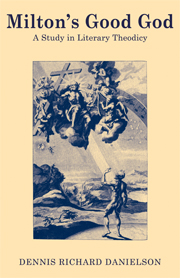Book contents
- Frontmatter
- Contents
- Preface
- 1 The contexts of Milton's theodicy
- 2 God and Chaos
- 3 Assertion and justification: providence and theodicy
- 4 Milton and the Free Will Defense
- 5 Theodicy, free will, and determinism
- 6 Eden and the “soul-making” theodicy
- 7 Paradise Lost and the Unfortunate Fall
- Epilogue
- Appendix: The unfortunate fall of Satan
- Notes
- Selected bibliography
- Index
Appendix: The unfortunate fall of Satan
Published online by Cambridge University Press: 04 August 2010
- Frontmatter
- Contents
- Preface
- 1 The contexts of Milton's theodicy
- 2 God and Chaos
- 3 Assertion and justification: providence and theodicy
- 4 Milton and the Free Will Defense
- 5 Theodicy, free will, and determinism
- 6 Eden and the “soul-making” theodicy
- 7 Paradise Lost and the Unfortunate Fall
- Epilogue
- Appendix: The unfortunate fall of Satan
- Notes
- Selected bibliography
- Index
Summary
Having considered the case against the theory of the Fortunate Fall as applied to Adam and Eve, the alert reader might well respond by asking about Satan. Was not his fall, and that of his cohorts, a precondition for the very creation of mankind? If man was created to fill the gap that occurred as a result of the angelic revolt, then must not the entire human race rejoice in that fall: “O happy fault that merited our creation”?
The simple answer is yes – if, that is, man was created merely to fill the gap. Such a supposition, however, is not entailed by anything that Milton says; and it would therefore be incorrect to impose the hypothesis of a fortunate angelic fall upon Paradise Lost.
Perhaps the clearest model of the unfortunate fall of Satan is that outlined by St. Anselm in his Cur Deus Homo, where he refers to that “part of our belief” according to which God designed “to make up for the number of angels that fell, from human nature which he created without sin.” Anselm, assuming that God ordained a “reasonable and complete number” of rational beings and that “man was created after the fall of the evil angels,” recognizes two possible interpretations: Either (1) the angels were “created perfect in number and … afterwards man was created to complete their number when it had been lessened”; or else (2) “they were not perfect in number, because God deferred completing the number, … determining in his own time to create man” (p. 213).
- Type
- Chapter
- Information
- Milton's Good GodA Study in Literary Theodicy, pp. 230 - 233Publisher: Cambridge University PressPrint publication year: 1982

